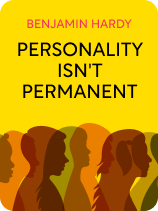

This article is an excerpt from the Shortform book guide to "Personality Isn't Permanent" by Benjamin Hardy. Shortform has the world's best summaries and analyses of books you should be reading.
Like this article? Sign up for a free trial here.
Can you change your personality? To what extent is one’s personality malleable?
According to psychologist Benjamin Hardy, science shows that your personality is not fixed and that you can change it. Studies consistently demonstrate that personality traits change over the course of your life. While he contends that your past influences your personality, it doesn’t fully determine it.
Here’s why personality isn’t permanent, according to Hardy.
Benjamin Hardy: Personality Isn’t Permanent
Can you change your personality? According to Hardy, most people think of their personality—that is, the totality of their abilities, preferences, and temperaments—as something innate and unchanging. This is exemplified by the popularity of personality tests (such as the Enneagram and the Myers-Briggs Type Indicator) which neatly categorize people into specific personality types. These tests are so popular, Hardy suggests, because people like to make sense of themselves—the tests give them metrics by which to define who they are.
Hardy contends that thinking about personality as a fixed feature comes largely from multiple misconceptions about how personality works. We’ve synthesized his ideas into two main misconceptions.
Misconception #1: The Past Determines Your Personality
The first misconception is that people think the past determines their personality. They succumb to the “end of history illusion,” the idea that everything that’s happened so far in their lives has shaped them into who they are today, but that their current self won’t change much going forward and won’t be shaped as much by future life events. As a result, they believe the past has the final word on who they are today. For instance, someone who always struggled with social confidence in the past might think that they are simply not a confident person: It’s just not in their DNA.
| Why People Fall for the End of History Illusion People may fall for the end of history illusion or cling tightly to the “self” a personality test labels them as because it offers a sense of security. On the other hand, believing your preferences and values will inevitably change over time can lead to anxiety and self-doubt because it invites the thought: If your preferences and values change, does that mean they’re poorly chosen, or that you’re wrong about your identity? However, it’s worth noting that it’s contradictory to believe both that you’re the product of your past and that your personality is unchanging. If your past influenced your current personality, then that means life events have shaped—and therefore can shape—your personality. |
Misconception #2: Who You Are Right Now Is Who You Really Are
The second misconception is that people think that who they are right now is their true, authentic self—that their current abilities, preferences, and temperaments define who they are at their core. Because our society teaches that being authentic is a good thing, Hardy explains, people who think that their current self is their authentic self often think this means they shouldn’t try to change any of their current traits—they should leave their personality as is.
(Shortform note: While Hardy sees the “authentic self” as a concept that holds people back from change, author Brené Brown offers a different view of an authentic self—arguing that it should actually be viewed as a vehicle for change. In The Gifts of Imperfection, Brown suggests that living authentically involves embracing—not resisting—change and being true to who you really are, rather than hiding your true self out of shame. You do this by saying what’s true and acting in alignment with your values, even when shame pressures you to speak and act inauthentically.)
The Idea of a Fixed Personality Limits What You Can Achieve
Hardy argues that these misconceptions—that you’re the fixed product of your past and that the way you are right now is who you really are—foster a major self-limiting belief: Change isn’t an option. As a result, you limit your life significantly: You choose jobs, relationships, and activities that you already do and aren’t outside your comfort zone. You believe that whatever feels uncomfortable or challenging to who you are now must not be for you, and you miss out on harder but more rewarding things.
In practice, this looks like settling for a lesser position at work because the one you’d rather have is daunting, or giving up on a new hobby because it wasn’t immediately enjoyable.

———End of Preview———
Like what you just read? Read the rest of the world's best book summary and analysis of Benjamin Hardy's "Personality Isn't Permanent" at Shortform.
Here's what you'll find in our full Personality Isn't Permanent summary:
- How personality is not fixed, but fluid and changeable
- How the narratives you tell yourself dictate what you’re capable of
- How to change your personality to become your optimal self






